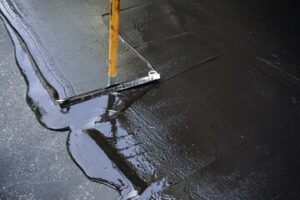You may have heard of primer, the skin-care version that helps makeup stay put, or engine primer that prepares a machine for use. Primers get you ready for what comes next, like a hyaluronic acid-spiked face serum that boosts hydration or a silicone-based primer that mattifies or blurs. Visit https://www.rochesternysealcoating.com to learn more.

Sealcoating protects asphalt pavement from the sun, rain, oil, and chemical damage. Regular sealcoating will make the paved surface last longer and prevent costly repairs. It also gives a fresh dark appearance to the driveway or parking lot that improves curb appeal. Whether you’re a homeowner with a small patch of pavement in the front yard or a business manager responsible for maintaining a large parking lot, a do-it-yourself seal coating can seem like a great idea at first. But buying cheap, low-quality materials from a big box store and applying them yourself could cost you more money in the long run.
A professional paving contractor will use a high quality, bituminous-based product for the seal coat, typically an asphalt emulsion. This liquid formulation is mixed with silica sand, polymer additives and other fillers. It is applied to the paved surface using spray equipment, brush or squeegee. The sand or other fillers give the seal coat a thick texture that will fill cracks and small holes, making the surface smoother.
When a paving company applies the asphalt sealer, workers will heat it to kill any bacteria or other organisms that may be living on the surface. Next, workers will flash-heat any oil or gasoline stains that have developed in order to remove them from the asphalt. These steps will allow the seal coat to bond properly with the paved surface.
During the application process, workers will make sure to apply the seal coat evenly. Over-slathering the asphalt sealer will cause it to wear down more quickly and can lead to premature cracking. It’s also important that the paved surface is completely dry before workers start sealing it. Trying to seal a wet or damp surface can shatter the asphalt sealer film, and it won’t adhere well to the underlying surface.
Prevents Water Damage
Sealcoating provides a protective shell over the asphalt surface, protecting it from rain, snow, ice, sun damage, and more. While it doesn’t hide larger cracks, it can help conceal them and prevent water from seeping down into the asphalt and causing further problems. Additionally, it improves the overall appearance of the asphalt, making it look new and fresh instead of worn down and beaten up.
The oxidation process wreaks havoc on the structural integrity of asphalt pavement, creating cracks that allow water to enter and further weaken it. This makes it very important to seal cracks and voids with the proper crack filling services before they become too big to repair. Sealcoating protects the asphalt from further damage by keeping water out and allowing it to flow freely down storm drains.
Unlike concrete, asphalt pavement is flexible and flexes under vehicle traffic, but as it ages and wears down, it becomes more brittle and susceptible to damage from weather, oil spills, chemical penetration, etc. Sealcoating acts as a defensive layer of armor that minimizes the impact of this stress on the pavement, slowing down oxidation and extending its life for minimal cost.
Once the asphalt has been cleaned and prepared for sealcoating, it’s applied with brushes, squeegees, or specialized spray equipment and then allowed to dry for a set period of time. It’s very important to keep people off of the freshly-sealed driveway or parking lot until it has had a chance to cure completely and bond with the asphalt, otherwise the sealant could be dislodged and the surface will become uneven and unattractive. This is why it’s essential to schedule your asphalt sealcoating in spring or fall, before the temperatures drop and winter begins to wreak havoc on your driveway or parking lot.
Prevents Oil Spills
Oil stains left untreated will break down asphalt and cause a major safety hazard. When an asphalt surface is coated with a protective seal coat, it helps prevent the penetration of harmful oils, gasoline, and chemicals into the pavement. This prevents the oxidation of the asphalt, minimizes cracking, and prolongs the lifespan of the parking lot or driveway.
One of the most common mistakes property owners make when it comes to pavement maintenance is allowing oil spots to remain on their asphalt surfaces. If an oil spot is not treated right away it can eat through the entire surface of the pavement. This will eventually lead to severe damage that may require a costly removal and replacement. Sealcoating helps prevent oil stains from staining your asphalt surface, so it is essential to have routine maintenance done to keep your parking lot or driveway in good condition.
Before sealcoating can be applied, your driveway or parking lot must be clean and free of any noticeable debris. The climate also needs to be dry so that the sealcoat can dry quickly. It usually takes 24 hours for the pavement to dry completely.
There are a variety of additives that can be added to the sealcoat mix. These additives can serve various purposes, including drying the sealcoat faster, changing sand suspension, increasing water repellency, improving flexibility, or adding resistance to salts and petrochemicals.
If you are looking for a cost-effective way to extend the life of your asphalt, improve the aesthetics of your parking lot or driveway, and protect your investment then seal coating is a must! A properly-applied sealcoat will give your driveway or parking lot a sleek, rich, and attractive appearance that will add to the curb appeal of your home or business. A well-maintained parking lot will not only reflect positively on your property, but it will also be a safe and inviting place for your guests to visit.
Prevents UV Damage
Asphalt pavement is known for its durability, strength, and resilience but that doesn’t mean it’s impervious to damage. The sun’s UV rays can be especially harmful to asphalt, which causes fading and other types of damage over time. Sealcoating creates a protective barrier that minimizes UV exposure, which extends the lifespan of your parking lot or driveway.
The sun’s rays can heat up asphalt to temperatures up to 172 degrees, and at this point, they start to break down the binders and aggregate of the pavement. This is similar to the way our skin breaks down when we expose it to sunlight without sunscreen. Asphalt needs its own form of sunblock, which is why asphalt sealcoating works so well. It protects your pavement from sun damage and slows down the aging process, extending its lifespan and improving its appearance.
Additionally, sealcoating helps prevent other damages like oil spills and stains from penetrating the surface of your parking lot or driveway. It also keeps chemicals and herbicides from soaking into the asphalt, which can cause further discoloration or breakdown. This is a major benefit for those who have a commercial business with a parking lot because it can save you money on expensive maintenance down the line.
Aside from protecting your asphalt pavement from weather and traffic, a sealcoat also adds an attractive sheen to your property, which can make it more appealing to your customers or guests. It also fills in small cracks and voids in the asphalt, giving it an overall more finished look that looks better than your pavement would without it. In addition, this dark coloration will help melt snow faster, making it easier to shovel your driveway or parking lot.
Prevents Cracking
Asphalt is extremely porous, and it is inevitable that water penetrates the surface. When this happens, the surface will become brittle and crack. Sealcoating prevents this from happening and prolongs the lifespan of the asphalt.
It is also important to note that sealcoating and crack filling are just as effective on older asphalt surfaces as they are on newer ones. The only difference is that older asphalt will have more oxidation and oil damage, which makes them more susceptible to the deterioration that results in cracking.
During the sealing process, a rubberized material is injected into the small cracks and crevices in the pavement. This prevents the cracks from becoming bigger, and it stops moisture from seeping into the base of the asphalt, which will cause a freeze thaw cycle. This cycle will destroy the asphalt in the cracks by expanding and contracting the voids, which eventually leads to a rip off or pothole.
Aside from preventing cracking, asphalt sealcoating can make your pavement look much better. After a fresh coat of sealant, the dark color will return to your pavement, and it will make it look as good as new. It will also make your parking lot or driveway look more appealing to visitors or tenants.

